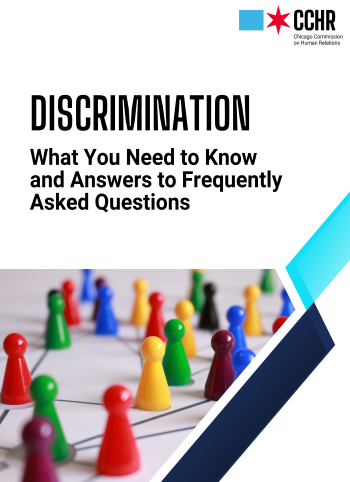File a Discrimination Complaint
All documents referenced below are available on the Commission's home page under the relevant "Featured Services and Programs."
Click the graphic above to download the brochure!
How to file a discrimination complaint
There are many ways to file your discrimination complaint:
- In person at the Commission's office
- Online via the Commission's website (*Scroll down and click on the words ONLINE COMPLAINT FORM in blue toward the bottom of the page.)
- E-mail (cchrfilings@cityofchicago.org) (PDF only)
- Fax
Continue reading for more information about each complaint filing method.
Who can file a discrimination complaint?
You can file a complaint and pursue a discrimination claim at the Commission on Human Relations if you believe you have been personally harmed by a violation of either the Chicago Human Rights Ordinance or the Chicago Fair Housing Ordinance.
You do not have to reside in the City of Chicago in order to file a complaint, but the alleged discrimination must have occurred in Chicago. The Commission must receive your complaint within 365 days of the incident. There is no cost to file.
Telephone inquiries about complaint filing
You may telephone the Commission during business hours for information about filing a complaint. The intake telephone line is 312-744-4474.
Although Commission staff cannot give you legal advice, staff can answer questions about—
-
Whether the Human Rights or Fair Housing Ordinance covers the claim you want to make
-
Other laws and agencies that may cover the type of claim you want to make
-
Complaint-filing and other Commission procedures
We recommend contacting us by telephone first to discuss the complaint you wish to file. Then if the Commission on Human Relations does not have jurisdiction over your claim, you will have saved the time and effort of filing and we may be able to refer you to another agency.
Information you must provide in your complaint
Use CCHR's Complaint form. The information you will be required to provide in the complaint is listed below. See Commission Regulation 210.120(c) for details. Stating this information correctly is your responsibility. You will sign your complaint under oath, and you are subject to penalties for any false statements to the Commission. See Regs. 210.410 and 210.420.
-
Your name, mailing address, and telephone number.
-
The correct name of each business or individual person you accuse of an ordinance violation (the “respondent”). You may name more than one respondent.
-
The full and correct mailing address of each respondent. The address must be sufficient to allow the Commission to “serve” the complaint by U.S. Mail.
-
A description of the conduct, policy, or practice which you claim is discriminatory. This description must be sufficient to notify the Commission and the respondent of the timing, locations, and facts which set the scope of your complaint.
-
The date of each discriminatory action you are alleging. The discrimination must have occurred within 365 days of the filing of the complaint.
-
The type/s of discrimination you claim as to each alleged discriminatory action, as well as your protected status with regard to each such claim. For example, if you are alleging national origin discrimination, you would state your national origin.
Help with drafting your complaint
You may come to the Commission’s office from 9:00 a.m. - 3:00 p.m. for help in drafting your complaint. The Commission is located at 740 N. Sedgwick, Suite 400, Chicago, Illinois, 60654. We encourage you to take advantage of this assistance, because Commission staff are trained to discuss jurisdictional issues and draft complaints in the correct form. Please keep these points in mind when coming in for assistance:
-
You must be prepared to provide the required information listed above. You are responsible for the accuracy and completeness of this information, not the Commission.
-
Please arrive at least two hours before closing to allow enough time to interview you and write up a complaint for you to review and sign.
-
You will be asked to complete a Background Form with information to help in drafting the complaint and to collect statistical information required by Federal rules. It also helps us monitor and assess our progress in achieving our equity goals, such as improving our outreach. This is an internal document. CCHR will not send it with the Complaint.
-
Staff will review the background form, interview you, and draft a complaint for you to review. You are responsible to make sure the complaint is as you want it. Staff will make any corrections after you review the draft, then you will sign the complaint under oath.
-
Language Access: CCHR has translation services available.
-
Accessibility: If you are in need of an ASL interpreter or other accommodation, please schedule your visit at least five business days in advance.
Preparing and filing your own complaint
While we recommend coming to the Commission for help preparing your complaint, you may prepare your own complaint, or your attorney may prepare it for you. Please keep these points in mind about complaints you prepare yourself:
-
You must use the Commission’s Complaint Form or something substantially equivalent which contains all the required information listed above.
-
Complaints cannot exceed five pages without permission of the Commission.
-
We recommend reviewing the Commission's publications about self-filing complaints along with Section 210.100 of the Commission’s regulations.
-
You may file your complaint in person, by mail, online, via e-mail, or by fax. You must make sure your complaint is received on or before the 365-day deadline date, at the Commission’s office during announced business hours. The Commission is located at 740 N. Sedgwick, Suite 400, Chicago, Illinois 60654. Please review Reg. 270.220(b) for further details about filing by mail or fax.
-
If an attorney will be representing you in the case, he or she should file an Attorney Appearance along with the complaint, using the Commission’s form or any other format that meets the requirements of Regs. 270.310, 270.320, and 270.330.
-
You are not required to serve your complaint on the respondent/s you have named. Complaints (and amended complaints during the investigation process) are the only documents the Commission serves for you. See Reg. 210.140. The Commission will mail you a copy of your complaint showing the case number assigned.
Filing your Complaint ONLINE
To file your Complaint online, read the instructions below.
Then, click here: ONLINE COMPLAINT FORM
- To file your Complaint online, read these instructions and click the red words “ONLINE COMPLAINT FORM,” above. You will be re-directed to DOCUSIGN and instructed write your full name and e-mail address.
- As the person filing the complaint, you are the “Complainant.” Do not make any changes to the boxes designated for the CCHR Receiver.
- Click “BEGIN SIGNING” at the bottom of the page.
- Next, you will be directed to CCHR’s BACKGROUND FORM. This is an internal form. CCHR will not send it to respondent. A respondent is who the complaint is filed against. Fill it out.
- Next, scroll down to the COMPLAINT. CCHR sends the Complaint to the respondents. Fill out the form.
- Describe what happened using brief, numbered paragraphs. When respondents respond to complaints, they admit or deny each numbered paragraph.
- In the first paragraph, state the adverse action the respondent took against you and your membership in the relevant protected class.
- EXAMPLE 1: “ Respondent ABC Employer refused to hire me based on my race. My race is African American.”
- EXAMPLE 2: “ Respondent XYZ Property Owner refused to rent an available apartment to me based on my source of income. My source of income is a CHA Housing Choice Voucher.”
- EXAMPLE 3: “ Respondent ABC Store denied me full and equal enjoyment of its store based on my disability when I could not enter the store because it has three steps at its entrance. I use a wheelchair for mobility due to severe arthritis.”
- Scroll down to the second page. Write the rest of your complaint, continuing to number each paragraph, “2., 3., 4., etc.”
- It usually makes sense to describe the incident/s in chronological order, from beginning to end. Be sure to include important details such as the WHO, WHAT, WHERE, WHEN, and WHY of what happened.
- In the final paragraph of your complaint, write one of the following:
- For Housing Complaints:
- “The above conduct is a violation of the Chicago Fair Housing Ordinance (Ch. 5-8 of the Chicago Municipal Code.) I am seeking all relief available under law.”
- For Employment, Public Accommodation, Credit, or Bonding:
- “The above conduct is a violation of the Chicago Human Rights Ordinance. (Ch. 6-10 of the Chicago Municipal Code.) I am seeking all relief available under law.”
- For Housing Complaints:
- When you are ready to file the complaint, click “FINISH,” at the top of the page.
After you file a complaint
You will be notified by mail regarding whether the Commission accepted your complaint. Accepting your complaint for filing does not mean the Commission has decided that an ordinance violation occurred. Complaint filing only starts the process of deciding the case.
If CCHR accepts your Complaint, you will be notified by mail with an Acknowledgment of Complaint Filing packet, which acknowledges receipt of your complaint and explains the Commission’s investigation and decision-making procedures. The mailing sets a deadline for you to file and serve a reply to any response filed by the respondent and to submit all “supporting documentation” you want considered when the Commission decides whether there is substantial evidence of an ordinance violation. The publication and forms included in the initial mailings are available on the Commission's homepage. Click on "Filing Forms." The Commission will “serve” your complaint by U.S. Mail on each respondent you have named, pursuant to Reg. 210.140.
If CCHR does not accept your complaint, you will be notified by mail with a Defective Complaint Notice, explaining why CCHR did not accept your complaint.
Responsibilities during the case
Filing a discrimination complaint is a serious step. It starts a legal proceeding against the respondents which you are responsible to prosecute. You must promptly update your address and other contact information, and you must cooperate in the investigation and processing of the case. Failure to comply with Reg. 210.127 and other regulations, notices, or orders of the Commission may lead to dismissal of the complaint and monetary sanctions under Section 235 of the Commission’s Regulations.
Amended complaints
You may need to file an amended complaint. It is especially important to file a timely amended complaint if a respondent engages in additional discriminatory or retaliatory conduct against you after you file your initial complaint, or if you forgot to describe a discriminatory action in your initial complaint.
Amended complaints are governed by specific (and sometimes complicated) rules and procedures, depending on when and why you wish to amend. It is important to consult these regulations as well as applicable case law:
-
Reg. 210.145. Amendment to Cure Technical Defects or Omissions.
-
Reg. 210.150. Amendment of Claims or Allegations.
-
Reg. 210.160. Amendment to Add or Substitute Parties.






